Fantastic XIII
Presentation
Who said that a chess-variant board
should have even dimensions?
Tamerlane II
uses a 11 x 11 board. Why not going a step further with
the odd number 13? This is the starting idea governing
this chess-variant.
An odd game should be different. That is its nature. Then, the army at fight in this game presents men which have not or seldom been used in my other games, despite they have a familiar style which make them easy to familiarize for the new players.
There are 13 types of pieces in this game, naturally if it is possible to say so. Several of them have a long three-square distance effect which is perturbing. The atmosphere at play is weird. It is just fantastic.
An odd game should be different. That is its nature. Then, the army at fight in this game presents men which have not or seldom been used in my other games, despite they have a familiar style which make them easy to familiarize for the new players.
There are 13 types of pieces in this game, naturally if it is possible to say so. Several of them have a long three-square distance effect which is perturbing. The atmosphere at play is weird. It is just fantastic.
Setup
The board is odd with 169 squares, made
by 13 rows and 13 columns.
There are 30 pieces in each side: 1 King, 2 Snakes, 2 Ships, 2 Hawks, 2 Mammoths, 2 Cheetahs, 2 Squirrels, all of them on the 1st row of each player; 2 Trolls and 1 Prince on the 2nd row, another single Troll on the 3rd row and 13 Pawns forming a complete line on the 4th row.
That sums to 10 types of piece in the setup. But three types of men may appear by “elevation”: Saber-tooth, Eagle, and Rhinoceros. In total, they are 13 different types of pieces.
The goal is to checkmate the opposing King. White side plays first.
There are 30 pieces in each side: 1 King, 2 Snakes, 2 Ships, 2 Hawks, 2 Mammoths, 2 Cheetahs, 2 Squirrels, all of them on the 1st row of each player; 2 Trolls and 1 Prince on the 2nd row, another single Troll on the 3rd row and 13 Pawns forming a complete line on the 4th row.
That sums to 10 types of piece in the setup. But three types of men may appear by “elevation”: Saber-tooth, Eagle, and Rhinoceros. In total, they are 13 different types of pieces.
The goal is to checkmate the opposing King. White side plays first.

Initial Setup at Fantastic XIII
Moves
-
King: moves 1 step in every (8) directions on a not attacked square. The King is in check if it is attacked by one or several enemy pieces. It is forbidden to play a move letting his King in check. There is no castling at Fantastic XIII.At his first move, the King may jump to a free square at two squares' distance as in other games such as Metamachy. It does not matter if the square jumped over is occupied or not; however, the jump is forbidden if that intermediate square is threatened by an enemy piece. When jumping like a Knight, at least one of the two intermediate squares must be free of threat. The King's jump is not permitted if the King is in check. This rule, which was once prevalent in medieval European chess, replaces castling.
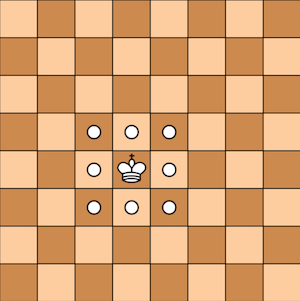
- Pawn: it moves as in Metamachy, not as is usual Chess. It can move straight forward one or two square from any position on the board, without capturing. It captures one square diagonally forward. It may capture en-passant and get promoted to a Saber-tooth when reaching the opposed side of the board.
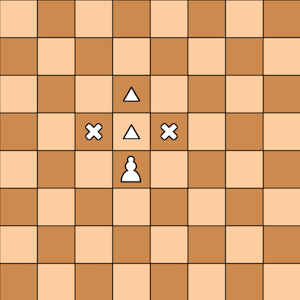
- Prince: as in Metamachy. He moves and captures one square in any direction like a King, but without being hindered by check. Like the Pawn, he can also move without capturing to the second square straight ahead from any position on the board and he get promoted to a Saber-tooth when reaching the opposed side of the board.
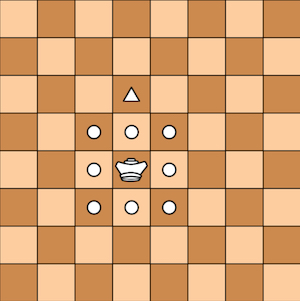
- Troll: as in Terachess, it jumps 3 step horizontally, vertically or diagonally. No matter what intermediate squares contain. It may capture while jumping in that way. The Troll is also able to move and capture as a simple Pawn, one step straight ahead to move on a free square or one step diagonally forward to capture an opponent. The Troll cannot move two steps forward at any moment. This permits the Troll to reach any square on the board. No e.p. It may promote to a Saber-tooth on the opponent's back row on some conditions explained below.

- Squirrel: it is a "ring" leaper which jumps as a Knight or jumps at 2 squares, diagonally (a move called Alfil) or orthogonally (a move called Dabbaba).

- Cheetah: it is another "ring" leaper which jumps on any square situated at 3 squares distance from where it stands.

- Mammoth: it steps horizontally, vertically or diagonally one or two squares, leaping over the intermediate square if it is occupied.

- Hawk: it jumps horizontally, vertically or diagonally two or three squares, leaping over the intermediate squares if they are occupied.

- Ship: a piece also used in Tamerlane II. It moves one square diagonally and then, goes away of an indefinite number of cases vertically, never horizontally. It can move one square diagonally only. It can not jump and must begin its move with the diagonal step. The Ship is more limited than the Eagle (which can move horizontally, see below). Nevertheless its move power is comparable to the Rook and the Bishop.
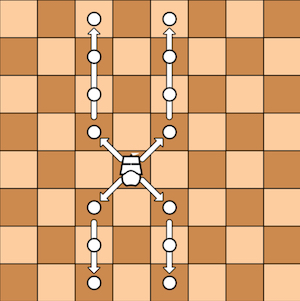
- Snake: it moves one square vertically and then, slides away of an indefinite number of squares diagonally. It can not jump and the unobstructed path must start with the vertical movement. The Snake is the counterpart of the Ship. Both pieces are constrained bent-riders because the vertical direction is favored compare to the horizontal one in the definition of their moves.

Three pieces are not present on the initial setup but
may appear during the game by promotion:
- Eagle: exactly as in Metamachy. This piece may appear in this game by promotion of a Ship. It moves one square diagonally and then, slides away of an indefinite number of squares vertically or horizontally. It is authorized to go only one square diagonal. It can not jump and the unobstructed path must start with the diagonal movement. This piece is also known as Gryphon in many chess variants.
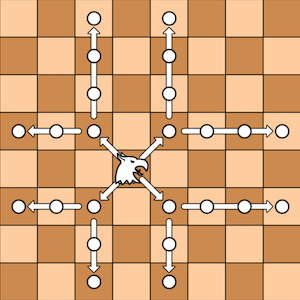
- Rhinoceros:
exactly as in Zanzibar.
This piece may appear in this game by promotion of a
Snake. It moves one square vertically or
horizontally and then, slides away of an indefinite
number of squares diagonally. It is authorized to go
only one square in line or column. It can not jump and
the unobstructed path must start with the orthogonal
movement. It is a counterpart of the Eagle. It is now
called Manticore on the chess-variants
pages.

- Saber-tooth
(Tiger): jumps on any square situated at 2
or 3 squares distance from where it stands. This piece
may appear later on by promotion of a Pawn, a
Prince or a Troll.
The Saber-tooth is a “double-ring” leaper: it combines the powers of the Squirrel and the Cheetah, meaning that it can leap at any square at two or three-square distance from the square where it stands.

Other rules
- Pawn and Prince Promotion: A Pawn or a Prince reaching the last rank of the board is immediately replaced by a Saber-tooth. Promotion to any other type of piece is not allowed.
- Troll Promotion: Trolls also promote to Saber-tooth on last row but only when they reach that line with a one-step move or capture, i.e. like a Pawn. They do not promote when they reach the last row by a long 3-square jump.
- Ship and Snake Promotion: These two pieces promote to Eagle and Rhinoceros respectively on last row, which is a manner of completing their powers for a uniform move in all directions.
- En Passant capture: Any time a Pawn or a Prince takes a double step and passes through the capture square of an opposing Pawn, that Pawn may capture the opposing piece as if it had only moved one square. This en passant capture must be made in the immediate move following the double step. Only a Pawn may capture en passant.
- End Of Game: The end-of-game rules, checkmate, stalemate, etc., are identical to standard chess. The goal is to checkmate the opposing King.
Pieces Value
Our estimate average pieces value, normalized to 5 for the Rook (if this piece was present on this game, which is actually not the case) is:
Pawn: 0.75, Troll: 3.25, Prince: 3.25, Snake: 3.5, Ship: 4.5, Hawk: 5.5, Squirrel: 6, Mammoth: 6.5, Rhinoceros: 7.5, Eagle: 8.25, Cheetah: 8.5, Saber-tooth: 17.5.




